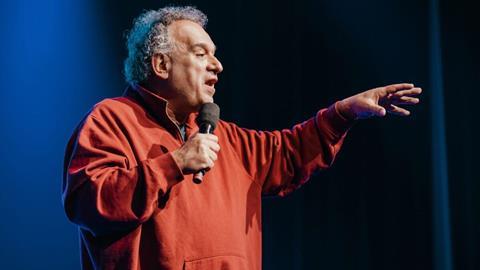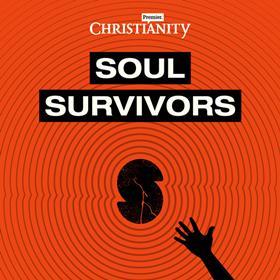When Kye* joined the staff team at Soul Survivor, he was a passionate believer in the ministry's values and mission. But his early optimism was soon dented by what he calls a "culture of control" overseen by the church's leader, Mike Pilavachi. Ahead of the release of Premier Christianity's new investigative podcast series, 'Soul Survivors', Kye shares his own story

Like the majority of the staff team, I was in my early 20s when I started working for Soul Survivor. I was looking for a change in career and I wanted to do something with my life that felt like it had more meaning and purpose.
I’d previously done some youth work on a voluntary basis and was also involved in leading worship at my previous church, so a Christian organisation that ran youth festivals focused on worship seemed like the perfect fit. I believed this was God calling me to a new chapter in my life where I’d serve him and he’d give me purpose and meaning.
I hadn’t heard of Mike Pilavachi before I started my job there. Unlike many of my colleagues, I hadn’t grown up as part of the Soul Survivor movement, and although I’d heard of the organisation, I wasn’t familiar with the personalities involved.
The inner circle
I think the thing that surprised me the most during my first summer helping run the festivals was how Mike’s larger-than-life on-stage personality was very different to his socially awkward demeanour behind the scenes.
I also found his leadership style very strange. On the one hand, he wanted to micromanage and keep tight control of the minutiae of the events, refusing to delegate or trust others except for a select few. On the other hand, he never came into the office to speak to the staff team directly, except on rare occassions. This led to a situation where there was a kind of ‘inner circle’ of trusted individuals, and if you weren’t part of this, your job was a lot more difficult.
This also happened within the church, too. For example, the worship pastor at the time wasn’t allowed to select worship leaders for the rota; that was only something Mike was allowed to do. By itself it doesn’t seem like much, but it is a small example of the culture of control, which turned out to run much deeper.
Despite this, Mike had an almost surreal magnetism about him – people were drawn to him (myself included), and people desperately wanted to please him and be noticed by him.
Unhealthy behaviour
The unhealthy behaviours were something I saw many times – the way Mike would collect young men from across the world, bring them to Watford, only to then drop and ignore them, leaving them hurting and broken and wondering what they’d done wrong when they fell out of favour.
Other examples include young worship leaders being given an opportunity to lead worship – either at the church, or even the main stage at the festival – only to be immediately dropped again, because there was something about them that Mike didn’t like. Rather than investing in these young people, and helping them to grow and improve, they were pushed aside – their ‘dream come true’ moment turned to crushing disappointment.
It took me years to really recognise just how problematic this was; that a man of his age, experience and position of power was treating people like that. At the time I chalked most of it up to his social awkwardness; I believed it must be people misinterpreting his actions.
Surely someone who was doing such good work couldn’t possibly be causing hurt to others in this way? If he ‘dropped’ people, then surely, he must have good reason to do so. I also thought that if there was really a problem with his behaviour then the rest of the leadership team would hold him to account.
With hindsight, it was very naive of me to believe that. Over time it became clear that Mike surrounded himself with people who wouldn’t challenge him, whether this was in relation to his personal actions or to his decisions about the organisation.
Toxic leadership
Everyone on the leadership team was Mike’s friend, and many of them were former interns or others who originally met him when they were teenagers or young adults. While at the time it seemed a bit odd to me, with hindsight I think it was quite problematic – he never appointed to positions of leadership people he couldn’t control.
It was a similar story with the trustees of Soul Survivor ministries. On paper it looked like the trustees were independent, but the reality was different.
Typically, in a charity it’s supposed to be the trustees who are the decision makers, but not so with Soul Survivor, where the reality was Mike was in charge and the trustees rubber-stamped everything he wanted to do.
I left Soul Survivor bitter, cynical, with no faith and a variety of mental health issues
Mike’s problematic behaviour was well known – it was common knowledge that many people had experienced the cold shoulder/silent treatment if they fell out of favour, and neither the leadership team nor the trustees did anything about this. Maybe some of them were afraid it would happen to them too.
It felt like Mike could make or break people’s careers and so there was a concerted effort by those in positions of power to ensure they were safe, by never criticising him, even if that meant sacrificing others.
Gaslighting
Many of the negative things I experienced personally weren’t done by Mike directly, but rather by others in leadership for whom keeping Mike happy was in their best interest. Even after I’d left, I was still frequently contacted by certain people in leadership who would demand my time even though I was, by that point, working a new job. They wouldn’t take no for an answer.
Not only was this incredibly unprofessional, but it made me feel used. A phrase that was frequently employed in the office was “we’re not professional, we’re relational!”. It became very clear Soul Survivor was neither.
Within the church it was a similar story – I eventually asked to step down from the volunteer teams I was part of due to health reasons, and was essentially gaslit into staying for longer by a senior member of the leadership team, because keeping things running smoothly was more important than my wellbeing. All of this combined took a huge toll on me.
I started at Soul Survivor optimistic, believing its work was important and amazed that I’d been called to take part in something so important. I left bitter, cynical, with no faith and a variety of mental health issues. I hugely regret staying there as long as I did and I’m still a long way from healing despite all this happening years ago.
Seeing all the recent allegations in the news has been very difficult – it brings back a lot of painful memories that I’d tried very hard to forget about. At the same time, it has also been freeing to see that I wasn’t alone in feeling this way.
I never thought the culture there would be exposed, but now seeing these things finally come to light gives me a small slither of hope that maybe, finally, there will be some accountability.
*Kye (name changed) is a former employee of Soul Survivor

In a statement responding to this story, Soul Survivor said, “We’re sorry to hear of Kye’s experience as part of the Soul Survivor festivals team and anyone else who has suffered as a result of Mike’s abuse. We are committed to Fiona Soulding’s independent review of culture and processes and the full implementation of her recommendations."
Premier Christianity is producing a multi-part podcast series which explores the allegations of spiritual abuse against Rev Canon Mike Pilavachi and analyses the lessons to be learned for the wider Church. Subscribe to 'Soul Survivors' here. If you would like to share to share your experience at Soul Survivor Watford, please contact our deputy editor on megan.cornwell@premier.org.uk. Your story will be treated with sensitivity and care.
































1 Reader's comment